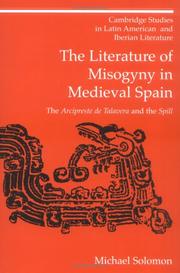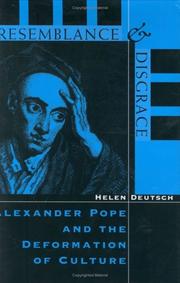| Listing 1 - 10 of 23 | << page >> |
Sort by
|
Book
ISBN: 3825372855 9783825372859 Year: 2022 Publisher: Heidelberg, Germany : Universitätsverlag Winter,
Abstract | Keywords | Export | Availability | Bookmark
 Loading...
Loading...Choose an application
- Reference Manager
- EndNote
- RefWorks (Direct export to RefWorks)
Book
ISBN: 9781009300070 1009300075 9781009300063 9781009300117 1009300091 1009300083 Year: 2024 Publisher: Cambridge ; New York, NY : Cambridge University Press,
Abstract | Keywords | Export | Availability | Bookmark
 Loading...
Loading...Choose an application
- Reference Manager
- EndNote
- RefWorks (Direct export to RefWorks)
The experiences of health and illness, death and dying, the normal and the pathological have always been an integral part of literary texts. This volume considers how the two dynamic fields of medicine and literature have crossed over, and how they have developed alongside one another. It asks how medicine, as both science and practice, shapes the representation of illness and transforms literary form. It considers how literary texts across genres and languages of disease have put forward specific conceptions of medicine and impacted its practice. Taking into account the global, multilingual and multicultural contexts, this volume systematically outlines and addresses this double-sidedness of the literature-medicine connection. Literature and Medicine covers a broad spectrum of conceptual, thematic, theoretical, and methodological approaches that provide a solid foundation for understanding a vibrant interdisciplinary field.
Literature and medicine. --- Medicine in literature. --- Health in literature.

ISBN: 0511004117 9780511004117 0521563909 9780521563901 0511089783 Year: 1997 Publisher: Cambridge New York Cambridge University Press
Abstract | Keywords | Export | Availability | Bookmark
 Loading...
Loading...Choose an application
- Reference Manager
- EndNote
- RefWorks (Direct export to RefWorks)
Misogyny in literature. --- Lovesickness in literature. --- Diseases in literature. --- Health in literature. --- Misogyny in literature --- Lovesickness in literature --- Diseases in literature --- Health in literature --- Spanish Literature --- Romance Literatures --- Languages & Literatures --- Martínez de Toledo, Alfonso, --- Roig, Jaume,
Book
ISBN: 1108953786 1108957269 1108957064 1108844847 110894891X Year: 2021 Publisher: Cambridge, United Kingdom ; New York, NY : Cambridge University Press,
Abstract | Keywords | Export | Availability | Bookmark
 Loading...
Loading...Choose an application
- Reference Manager
- EndNote
- RefWorks (Direct export to RefWorks)
Victorian Britain witnessed a resurgence of traditional convalescent caregiving. In the face of a hectic modern existence, nineteenth-century thinkers argued that all medical patients desperately required a lengthy, meandering period of recovery. Various reformers worked to extend the benefits of holistic recuperative care to seemingly unlikely groups: working-class hospital patients, insane asylum inmates, even low-ranking soldiers across the British Empire. Hosanna Krienke offers the first sustained scholarly assessment of nineteenth-century convalescent culture, revealing how interpersonal post-acute care was touted as a critical supplement to modern scientific medicine. As a method of caregiving intended to alleviate both physical and social ills, convalescence united patients of disparate social classes, disease categories, and degrees of impairment. Ultimately, this study demonstrates how novels from Bleak House to The Secret Garden draw on the unhurried timescale of convalescence as an ethical paradigm, training readers to value unfolding narratives apart from their ultimate resolutions.
English fiction --- Literature and medicine --- Health in literature. --- Care of the sick in literature. --- History and criticism. --- History
Book
ISBN: 9782359351958 Year: 2017 Publisher: Limoges : Lambert-Lucas,
Abstract | Keywords | Export | Availability | Bookmark
 Loading...
Loading...Choose an application
- Reference Manager
- EndNote
- RefWorks (Direct export to RefWorks)
Literature and medicine --- Medicine in literature --- Health in literature --- Medicine and the humanities --- Bibliotherapy --- Congresses. --- Congresses. --- Congresses. --- Congresses. --- Congresses.
Book
ISBN: 3825379078 9783825379070 3825346560 9783825346560 Year: 2020 Publisher: Heidelberg : Universitätsverlag Winter,
Abstract | Keywords | Export | Availability | Bookmark
 Loading...
Loading...Choose an application
- Reference Manager
- EndNote
- RefWorks (Direct export to RefWorks)
German literature --- Self-care, Health --- Health in literature --- Health in art --- Civilization, Medieval --- History and criticism --- 1050-1500

ISBN: 0674764897 Year: 1996 Publisher: Cambridge (Mass.) : Harvard university press,
Abstract | Keywords | Export | Availability | Bookmark
 Loading...
Loading...Choose an application
- Reference Manager
- EndNote
- RefWorks (Direct export to RefWorks)
Abnormalities, Human, in literature. --- Health in literature. --- Imitation in literature. --- Literature and society --- Monsters in literature. --- Verse satire, English --- History --- History and criticism.
Book
ISBN: 3837617602 9783837617603 Year: 2014 Publisher: Bielefeld : Transcript Verlag,
Abstract | Keywords | Export | Availability | Bookmark
 Loading...
Loading...Choose an application
- Reference Manager
- EndNote
- RefWorks (Direct export to RefWorks)
Acquired Immunodeficiency Syndrome --- Communicable Diseases --- Diseases in literature --- Diseases in literature. --- Gender Identity --- German literature --- German literature. --- Health in literature --- Health in literature. --- Literature and medicine --- Literature and medicine. --- Medicine in Literature --- Sexually transmitted diseases --- history. --- History and criticism --- 1800-1999. --- Germany.
Book
ISBN: 9780231202336 Year: 2021 Publisher: New York : Columbia University Press,
Abstract | Keywords | Export | Availability | Bookmark
 Loading...
Loading...Choose an application
- Reference Manager
- EndNote
- RefWorks (Direct export to RefWorks)
"Though often seen as scientific or objective, medicine has a fundamentally narrative aspect. Much like how an author constructs meaning around fictional events, a doctor or patient narrates the course of an illness and treatment. In what ways have literary and medical storytelling intersected with and shaped each other? In Medical Storyworlds, Elena Fratto examines the relationship between literature and medicine at the turn of the twentieth century-a period when novelists were experimenting with narrative form and the modern medical establishment was taking shape. She traces how Russian writers such as Dostoevsky, Tolstoy, and Bulgakov responded to contemporary medical and public health prescriptions, placing them in dialogue with French and Italian authors including Romains and Svevo and such texts as treatises by Paul Broca and Cesare Lombroso. In nuanced readings of these works, Fratto reveals how authors and characters question the rhetoric and authority of medicine and public health in telling stories of mortality, illness, and well-being. In so doing, she argues, they provide alternative ways of thinking about the limits and possibilities of human agency and free will. Bridging the medical humanities, European literary studies, and Slavic studies, Medical Storyworlds shows how narrative theory and canonical literary texts offer a new lens on today's debates in medical ethics and bioethics"--
Death in literature. --- Death in literature. --- French literature --- French literature --- Health in literature. --- Health in literature. --- Italian literature --- Italian literature --- LITERARY CRITICISM / Russian & Former Soviet Union. --- Literature and medicine. --- Literature and medicine. --- Medicine in literature. --- Medicine in literature. --- Russian literature --- Russian literature --- Russian literature --- Themes, motives --- Themes, motives. --- Themes, motives --- Themes, motives. --- Themes, motives --- Themes, motives --- Themes, motives. --- 1800-1999.
Book
ISBN: 1785277111 1785277103 178527712X Year: 2021 Publisher: London : Anthem Press,
Abstract | Keywords | Export | Availability | Bookmark
 Loading...
Loading...Choose an application
- Reference Manager
- EndNote
- RefWorks (Direct export to RefWorks)
As countless alterations have taken place in medicine in the twenty-first century, so too have literary artists addressed new understanding of disease and pathology. Dis/ability studies, fat studies, mad studies, end-of-life studies, and critical race studies among other fields have sought to better understand what social factors lead to pathologizing certain conditions while other variations remain 'normalized.' This collection of essays is open to all critical engagements with narratives of health in order to facilitate the messiness of cross-disciplinary collaboration and interdisciplinarity. As scientific advances provide insight into a wide range of well-being issues and help extend life, it is vital that we come to question the very categories of healthy and unhealthy. This collection brings together analyses of cultural productions which probe those categorizations and suggest new psychological and philosophical understandings which will help better apply and guide the knowledge being rapidly developed within the life sciences. The contributors share an interest in addressing who controls answers to the questions of 'how do we define a healthy body and a healthy life?' and 'what are the political forces that influence our definitions of health?'
The globalization of healthcare protocols has brought many advances but also challenges to traditional understanding of health within many cultures. This collection includes papers that examine narratives of health from all countries, cultures, and communities and is not limited to a North American or Western locus. Further, just as Edward Said problematized 'travelling theory' this book hopes to bring together scholars who look at how literary works also show that medical interventions from a Western perspective need to be challenged when applied to communities whose voices are often not heard or deliberately undermined when those 'treatments' are developed.
Health in literature. --- Health --- Political aspects. --- Health in art. --- Narrative art --- Health aspects. --- Art, Narrative --- Narrative art (Visual arts) --- Art genres --- Personal health --- Wellness --- Medicine --- Physiology --- Diseases --- Holistic medicine --- Hygiene --- Well-being
| Listing 1 - 10 of 23 | << page >> |
Sort by
|

 Search
Search Feedback
Feedback About UniCat
About UniCat  Help
Help News
News